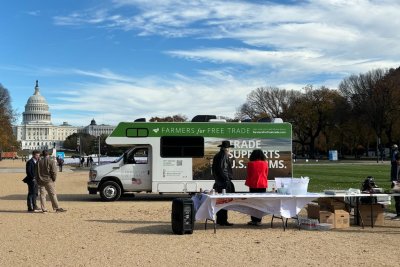Farmers for Free Trade tour ends in D.C.; group urges policy action

1 of 4 | Farmers for Free Trade sets up on the National Mall lawn to conclude its two-month tour, hosting farmers and organization leaders in Washington on Tuesday. Photo by Bridget Erin Craig/UPI
WASHINGTON, Nov. 4 (UPI) — Farmers for Free Trade, a nonprofit group that advocates for lower tariffs and expanded global market access, wrapped up its “Motorcade for Trade” tour Tuesday in Washington to urge policymakers to ease trade tensions and support struggling producers.
Dozens of farmers joined at different points along the route to participate in town halls and farm stops, contributing to discussions on trade priorities, export markets and challenges.
The organization has prioritized five issues, including tariff reductions, exemptions for agricultural necessities, such as fertilizer and equipment, and a timely review of the U.S.-Mexico-Canada Agreement.
The caravan began Sept. 5 in Dorchester, Neb., with a cooperative event between farmers and Rep. Adrian Smith, R-Neb. The next three stops included sessions with Reps. Dusty Johnson, R-S.D., Zach Nunn, R-Iowa, and Jim Baird, R-Ind.
Although the Farmers for Free Trade team did not live in its RV, the group named it Ruth after driving more than 2,800 miles with it, spending many hours inside planning and being interviewed with their furry companion, a dog named Huckleberry.
“It’s really about getting information from farmers throughout the Midwest to understand what impact the administration’s trade and tariff policies have had on individuals,” said Brent Bible, an Indiana grain farmer. “It’s had an individual impact, not just on producers, but on communities throughout rural America,”
The caravan made 10 stops — in Nebraska, South Dakota, Iowa, Indiana, Michigan, Wisconsin, Minnesota, Ohio, Pennsylvania and Washington.
“We hosted events throughout the Midwest — everything from meetings with members of Congress to farmer roundtables and tariff town halls,” said Brian Kuehl, the Farmers for Free Trade executive director.
Between the fourth and fifth stop, Kuehl said, it became increasingly difficult to set a schedule.
“Our No. 1 one priority was to meet with members of Congress, and a lot of times you wouldn’t know their schedule until a few days in advance. Then, in the middle of the tour, we had the government shutdown. A bunch of members we had events with canceled because they had to be in D.C.,” Kuehl said.
His team then pivoted to hosting listening sessions and trade talks with farmers, along with visiting the Ohio Chamber of Commerce, the World Dairy Expo in Wisconsin and various farms.
Despite some adjustments, Kuehl shared his team’s optimism for the tour.
“One of the things that’s so cool about agriculture is how diverse it is throughout the United States,” he said. “In the Midwest, you’re looking at soybean and corn farms. As we moved east, we saw more dairies and hog farms. We even visited a winery in Pennsylvania. Pretty much the trade disruptions are impacting them all negatively.”
In Indiana, Bible said, “Our input costs have gone up dramatically because of tariffs on imports — fertilizer, equipment, steel, aluminum. If we need a replacement part or a new tractor, all of those things are impacted. We’re getting squeezed at both ends, and when that happens, there’s nothing left in the middle.”
In Ohio, corn, soy and cattle farmer Chris Gibbs said, he’s felt that squeeze firsthand. After more than 40 years in agriculture, he described 2025 as “a cash flow and working capital crisis,” noting that he’s paying well above production costs for major crops.
“We’re about $200 per acre under the cost of production for corn and about $100 under for soybeans,” Gibbs said.
Because of the shutdown — now the longest in history — the U.S. Department of Agriculture “is essentially not functioning,” Gibbs said. “They normally release reporting information that the market relies on, but that hasn’t been occurring. Farmers are having to make major business decisions without the data we depend on.”
Gibbs added: “I’ve been farming almost 50 years, and I’m struggling, If I’m having to move money around just to stay afloat, what happens to the young farmers who don’t have savings yet? They’re hanging on by a thread.”
Farmers strategically planned the finale of their motorcade to be in Washington this week in alignment with the Supreme Court of the United States’ schedule. The high court plans to hear oral arguments Wednesday on whether the International Emergency Economic Powers Act authorizes President Donald Trump to impose tariffs to the extent he has.
“We’re in a commodity business,” Bible said. “If we have a truly free, functioning market, we can be competitive. But that hasn’t been the case. Prices have been artificially manipulated by policy decisions and retaliation from other countries.”